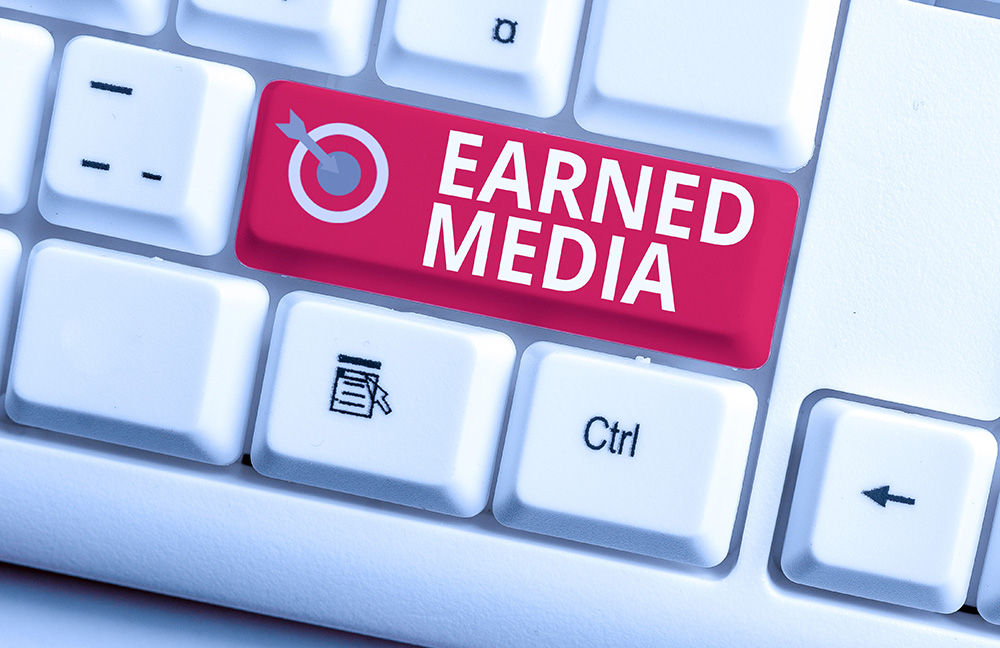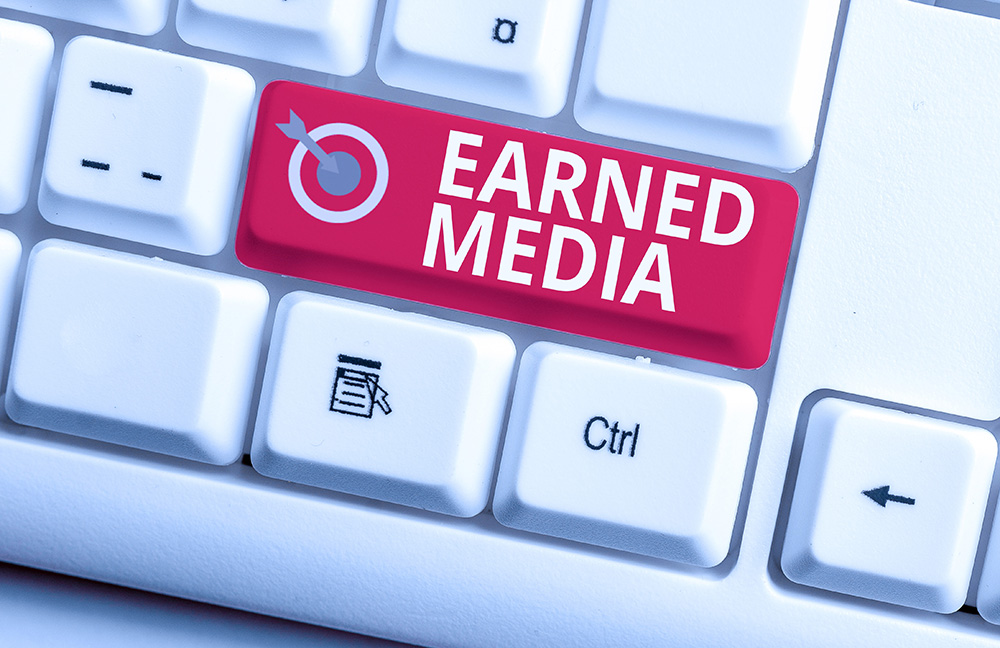The competition for earned media attention is strong. Your small businessfights for customers' attention with Fortune 500 corporations, direct rivals, and even mom and pop shops. When the various alternatives for your broken attention, such as social media, email, text message, and blogs, fail you, you may ask what else is available.
You might quickly lose the attention of today's audience. This necessitates the use of earned media. Historically, what appears to be old is frequently reborn as new. You may be wondering, though, how you might stand out from the throng.
What Is Earned Media?
Earned media is any marketing activity that is not paid for by your brand and does not entail any PR or marketing effort. Earned media is defined as any attention that is earned — see what I did there? — from your audience naturally without your monetary contribution.
Earned media is simply word-of-mouth marketing in digital form. And, because customers value suggestions from real people more than brand and marketing word, you should absolutely pay attention to earned media.
Earned media consists of the following:
- Articles and coverage in the news
- Word-of-mouth marketing
- Mentions from influencers
- Testimonials from customers
- Reviews and ratings
- Mentions on social media
- Likes, shares, retweets, and reposts are all forms of social media interaction.
If there was any doubt, social media engagement is earned media obtained via your own means. Earned media value is another method for calculating your social media ROI.
Why Earned Media Is Important?
Unless you are in a relatively new business, the market is already saturated with items similar to yours. Every brand, like you, produces content, advertisements, and other forms of media.
For a moment, put yourself in the shoes of your end-user.
Isn't there a lot of information to go through simply to discover the right product or service for you?
On the other side, if a buddy has done all of the legwork and recommends a product, wouldn't you skip the research step entirely and go with their recommendation?
This is precisely why earned media is so critical.
Having people who can publicly endorse you offers you third-party legitimacy and drives buyer intent more than any landing page highlighting your finest features could possibly do. Your brand advocates are effectively doing the job for you in terms of marketing.
Earned media raises brand recognition and puts your brand in front of more eyes, attracting potential customers' attention. One of the finest instances of the value of earned media is how Eggo earned over $200,000 in earned media value in 2017 simply by being featured in Netflix's Stranger Things.
Earned media is difficult to achieve since you have no influence over what is written about your business online. Even if you don't own the story, earned media should still be an important element of your marketing plan.
What Are The Benefits Of Earned Media?
While it can be difficult to adopt at first, the benefits of earned media greatly exceed the drawbacks of doing so for the first time. Earned media, as opposed to purchased media, will only cost you your time, but the outcomes will have you coming back for more. Earned media success will increase brand recognition, authority, and reputation, as well as enhance search engineresults.
- Increase Brand Awareness. Creating content and marketing it to high-authority media publications will start the conversation about your brand rolling. When your company is highlighted in major media channels, new consumers will discover you for the first time.
- Boost Your Credibility and Authority. When your material is included in an online news publication, potential clients will link the news outlet's authority with your business. They trust the website where they get their material, and as a result, they will come to trust your brand as well.
- Create Your Brand's Reputation. Earning media attention from top-tier sites will allow you to control how you're discussed online. You may develop content that will position your brand strategically, and then the articles written about your content will reflect on your brand.
- Boost and improve your search engine rankings. One of the most significant advantages of earned media is its impact on search engine results and how quickly people find you through Google searches. When respectable web media such as the Washington Post and CNBC promote your work, they will link back to your site. This tells Google that your site is useful and trustworthy, and it will most likely boost your rank in the SERPs.
What Are The Examples Of Earned Media?
The examples below are typical of what earned media looks like in practice. They also demonstrate the importance of monitoring earned media in 2021 and why PR professionals should do so.
- Original social media posts about your product. Customers or followers of your firm may promote your brand for free by writing about their experience with your product or service in an original social media post, rather than sharing material generated by your brand. Earned publicity occurs when a consumer tweets about “the finest brunch ever!” at a restaurant and the message receives numerous likes and retweets.
- Online consumer feedback. While being mentioned positively might be beneficial to your company, it's also crucial to remember that earned media includes a negative Yelp review from a different client who had "the worst brunch ever" at the same restaurant. Customers' ways of expressing their thoughts about items they've used have evolved in recent years, and are no longer confined to dinner discussions and phone calls. People now write reviews on websites like Yelp, TripAdvisor, Amazon, Google Reviews, and others when they come across a product (whether they love it or hate it). Every single one of those evaluations about your company is earned media.
- Product reviews may be found on YouTube, social media, and blogs. Product or service reviews draw attention to your business and inform potential buyers about it. If they are favorable, they can immediately lead to higher sales. Bad reviews, on the other hand, might have a detrimental influence on your bottom line.
- Natural incorporation of your products or services into third-party media. Even if content creators aren't actively looking to draw attention to your brand, products, or services, you may still gain free PRand earned media if your company's items are included in their film or photograph. This is especially useful if the film or photograph depicts the participants in a pleasant setting or having a nice time while utilizing (or simply being in the presence of) your items or brand.
- Coverage of your products, services, brand, or eventsin the media. When earned media is generated as a consequence of press coverage, it is frequently in the form of a direct mention to your company or brand. Take a look at how much buzz the Tesla marketing approach is creating on a shoestring budget. However, you may profit from the same tangential integration in the same manner that you would with YouTube or social network postings.
- Recommendations from others. Another example of earned media is word-of-mouth. It has the same impact as a Yelp review or a tweet - and it's free! Social media and viral marketingcan help to increase this sort of earned media. It includes everyday discussions between satisfied customers and people seeking a product or service similar to yours. When individuals speak about your forthcoming webinar and share it with their network of friends on social media, this is an example of good earned media through word-of-mouth referrals. Keep in mind that you may use email marketingto try to enhance the instances of word-of-mouth earned media. First, choose your chosen email marketing solution, and then utilize content marketingto sign them up for an email list. Then, utilize automation to provide value and urge consumers to forward the email to others who may benefit. While this may appear to be a tall order, if you develop high-quality material that provides a lot of value, people will be happy to share it with others for free.
- Inclusion in a commercial journal. Earned publicity occurs when your company is included in a trade journal oriented toward an industry in which you are engaged. Although such publications have a somewhat lower reach, they sometimes have a very high value per impression since they provide free exposure in front of your target demographic.
- Search engine traffic that is not purchased. This is a difficult example to describe because earned media is generally in the form of textual or video material. Organic traffic, on the other hand, that is generated solely by your website's natural ranking and not through sponsored advertising, is a form of earned media. You've "earned" visitors to your content by ranking high in search results. Although the content in the search results is related to your owned media, the production of search engine traffic for keywords, aside from direct searches for your brand, is a great example of earned media. This raises an important question: Is SEOearned media? No, it does not. Technically, SEOis not earned media. It is a procedure that you may regulate to optimize the performance of your media. However, you may still “earn” search engine traffic through optimization efforts, making organic traffic a kind of earned media — even if the content itself is categorized as owned media.
- Roundups of products. Content writers enjoy writing "roundup" articles that highlight the greatest sorts of things for buyers looking for high-quality stuff. If your product or service is excellent enough, someone may wish to put it in their roundup, resulting in earned exposure for your company.
5 Tactics To Earned Media Attention
Now that you understand what earned content is and why it is so essential, let's look at how you can include it into your content strategy.
Create Shareworthy Content
While content production may initially come under the purview of your owned contentstrategy, it frequently overlaps with earned content.
When your material is exceptional, it receives the likes and shares of your social media following, causing it to get seen and read by a larger audience.
Third-party media will also take up and publish successful pieces of material. So work extra hard on your content production to create the type of material that will catapult you into the spotlight you desire.
Attend In Trade Shows
Live events, such as trade fairs, are an excellent method to get your brand in the spotlight and into people's thoughts. Use social media to promote your participation in the event.
Use Facebook Live and other similar channels to make your audience feel more directly connected to the event.
Make the most of the weeks leading up to the trade fair. Typically, events like these will provide a list of attendees, including influencers, bloggers, and journalists.
Reach out to these people via email or social media and ask them to your booth; you could even give them an interview or a free trial of your product.
If you observe individuals referencing your business on social media during or after the event, seize the chance. Reach out with a simple but effective “thank you for sharing” comment, and maybe offer links to further material.
Events like this aid in the formation of connections and the credibility of your business. You may be able to reach new audiences while also obtaining the third-party validation that such earned content provides.
Be A Speaker
Many people are hesitant to pursue public speaking positions because it does not come easily to them. If this describes you, you are not alone — and it should not be a barrier to your success. Public speaking is a skill that must be honed — and practice is required.
Start small and do your homework on local events. As your confidence and reputation increase, you may opt to attend larger gatherings.
Make your speaking engagement known to your audience well in advance of the occasion. Parts of it may be shared on social media, and you can even use Live video during the event to pull in your audience.
This establishes you as a thought leader in the public's eyes, which is a significant motivator in obtaining the type of media you desire.
Participate In Online Communities
Participate in LinkedIn groups that are relevant to your field of expertise. Why not make your own if none exist? Instead of flooding these groups with self-promotional content, give valuable counsel for difficulties as well as a unique perspective on the business as a whole.
Sign up for Quora, a free online communitywhere individuals can ask questions split into topics. Use your industry knowledge to respond to their inquiries. These responses help to establish your reputation and will be viewed by anybody who asks that question in the future.
These communities provide you with a vital connection to your target audience. They are more inclined to study your business after seeing your knowledge in action.
Reach Out To Influencers
Influencers in your business are people who have a significant following, such as on a social media network. If an influencer publishes or talks about your material, it will be a significant boost to your public relations campaign.
Choose an influencer who is relevant to your sector and whose audience you want to reach. Find the finest influencers to fit your PR goalswith PR tools like BuzzSumo or Traackr.
Before approaching the ideal influencers for your PR plan, conduct your homework and connect with them on their social networks. Remember that they undoubtedly receive dozens of inquiries, so make your approach personal and one-of-a-kind.
One method to include influencer marketinginto your earned content strategy is to produce and distribute industry-leading content. Make certain that it is one-of-a-kind and creative. This type of material piques the interest of others, including influencers, who may subsequently share it with their own audiences.
Another method of using influencer marketingis to include an influencer in your article. Conduct an interview with him or her and create an article highlighting their knowledge and skills. They will most likely share that piece of content with their audience, therefore expanding your reach.
What Are Examples Of Earned Media?
- Original social media posts referencing your product
- Online customer reviews
- Product reviews on YouTube, social media, or blogs
- Media coverage of your products, services, brand, or events
- Natural inclusion of your products or services into external media
- Word-of-mouth recommendations
Why Is Earned Media Important?
The media gained has demonstrated superior ROI and are also cheaper. Companies don't have to pay for the content or medium for the publication of contents directly. Using a blend of paid, owned and earned media methods is a wonderful way to make your business credible and aware.
It's not a revolutionary thought that gains media gains. For decades enterprises have utilized strategies of public relations to contact the media. It seeks, in order to achieve their target market and to improve credibility, to encourage periodicals to write stories about their business and brand. With the media landscape moving from physical to online, and with more consumers participating with social media, it becomes even more crucial to analyze and generate earned media.



